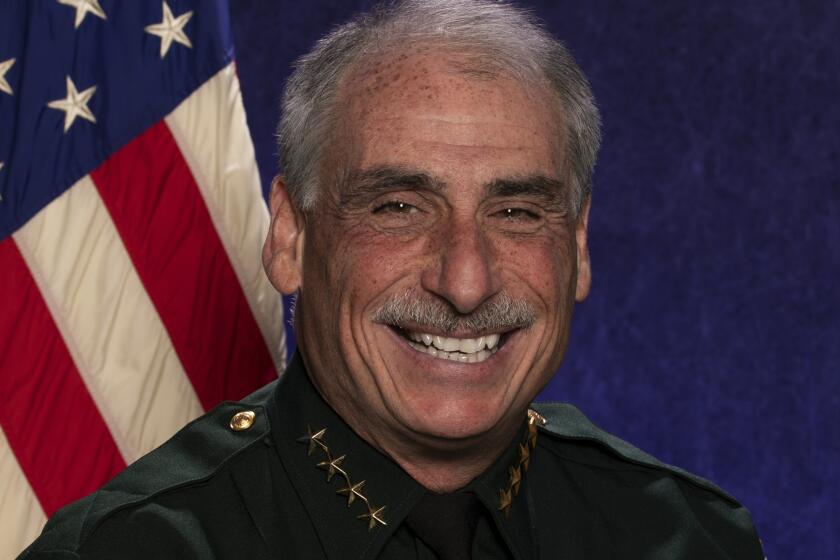U.S. Seeks Support for Baghdad
U.S. officials have begun a new diplomatic initiative in the Middle East, shuttling among Arab capitals to press Iraq’s nervous Sunni Muslim neighbors to step up their cooperation with the Shiite-dominated government in Baghdad.
With a referendum on Iraq’s draft constitution approaching, the U.S. officials have been urging Sunni-led governments to use their influence to persuade Iraq’s Sunnis to take part in the democratic process. The visiting U.S. officials, who include State Department Iraq advisor James Jeffrey and Ambassador to Iraq Zalmay Khalilzad, also have been encouraging the governments to increase diplomatic support and financial aid to Baghdad.
The mission comes amid flaring tensions between Iraqi officials, who worry that their neighbors are quietly undermining their weak government, and the Sunni-dominated neighbors, who fear that a Shiite leadership in Baghdad could take orders from Shiite-dominated Iran. The constitutional referendum, which some Arab leaders see as another step toward Shiite domination, is adding to the unease, diplomats say.
On Sunday, Iraq’s interior minister reacted angrily to complaints by the Saudi foreign minister, Prince Saud al Faisal, about Iranian influence in Baghdad. Interior Minister Bayan Jabr, a Shiite, declared that Iraq was “the cradle of civilization” and should not be lectured “by a Bedouin riding a camel.”
Jabr also took a swipe at Saudi Arabia’s Sunni monarchy for ruling like a dictatorship and “naming a whole country after a family.”
Iraqi officials have voiced a variety of complaints about nearby countries, including that they do too little to prevent militants from crossing the borders and that they haven’t offered condolences when large numbers of Iraqis have been killed in insurgent violence.
“The rhetoric has been quite high, and that has made it important that the United States consult with these countries about how the relationships can be improved,” said Patrick Clawson, deputy director of the Washington Institute for Near East Policy.
U.S. officials have been pressing neighboring nations since soon after the March 2003 invasion to increase their diplomatic and financial support to Iraq but are not satisfied with the results. Arab governments promised billions in aid at a donors conference two years ago but have delivered only a fraction -- because, they say, the insurgency has made reconstruction impossible in many areas.
The neighbors repeatedly have promised strong diplomatic support. But when Jordan’s foreign minister visited Baghdad last month, he was the first of his rank from an Arab country to do so. Neighboring governments have repeated that security is the reason, noting the assassination this summer of Egypt’s ambassador to Iraq.
Khalilzad recently took the U.S. message to Saudi Arabia, as did Jeffrey. And Jeffrey is now on a five-nation trip in the Mideast. Over the weekend, he discussed the Iraq situation at an Arab League meeting in Cairo.
That session resulted in a decision to send Arab League Secretary-General Amr Moussa to Iraq this week to take part in a “reconciliation” conference aimed at reducing tensions among the country’s religious and ethnic groups.
A majority of Iraqis are Shiites, but Sunni Arabs dominated the nation’s political life for decades, including under Saddam Hussein. Disaffected Sunnis are believed to make up the core of the nation’s insurgency.
Sean McCormack, the chief State Department spokesman, said that the Arab League’s decision to send Moussa on his first trip to Baghdad since the U.S.-led invasion was “a positive development.”
McCormack noted that at a meeting in Brussels this summer, Arab nations and other countries offered “a lot of diplomatic support for Iraq. I think it’s important now for that diplomatic support to manifest itself in different ways.”
A senior Bush administration official, who spoke on condition of anonymity because of diplomatic sensitivity, said that the presence of Arab diplomats in Iraq would lend credibility to the fledgling government, and alleviate sectarian frictions by showing Iraq’s Sunnis that Sunni-led governments don’t want the country to splinter along sectarian lines.
But the official acknowledged that the regional governments had not been moving as vigorously as the United States would like to help build Sunni support for the evolving government.
“We’ve been talking to them for some time about this, and we’re seeing some progress,” he said. “But it’s step by step.”
He acknowledged that U.S. officials were still trying to secure commitments from Arab governments to provide more financial aid to Iraq.
Nabil Fahmy, Egypt’s ambassador to the United States, said in an interview that his country recognized that it, like other nations, had “a vested interest in making Iraq a success.” Though Egypt has encouraged Sunnis to take part in Iraq’s government, he said a key goal was to ensure that all groups are full participants.
Clawson said it was especially important for governments in the region to offer support for the democratic process in Iraq, because Sunnis might feel bitterly disappointed if they failed at the ballot box to defeat the proposed constitution, which many believe short-changes their interests.
More to Read
Sign up for Essential California
The most important California stories and recommendations in your inbox every morning.
You may occasionally receive promotional content from the Los Angeles Times.











